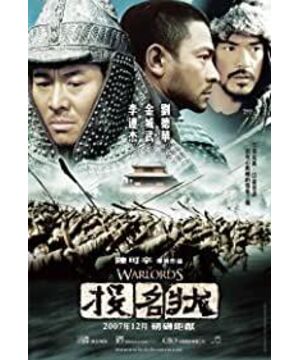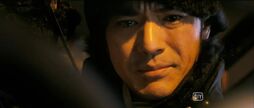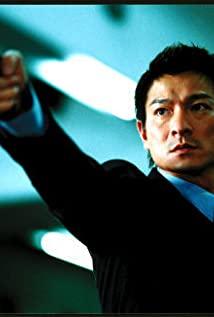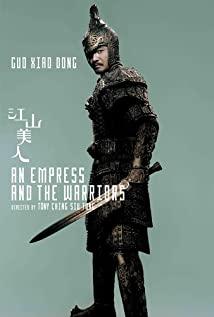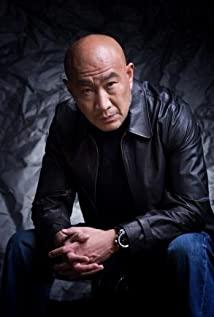☆There is no unswerving love, no inextinguishable loyalty, women are nothing but prostitution, human nature is no match for desire, loyalty and righteousness are no match for power and conspiracy, and no matter how much power is played, it can’t compare to the high imperial power - this is Chen Kexin's dark The dark logic of cinema.
☆This is the "Men's Play" directed by Chen Kexin. He has concealed the light and warmth that must exist in history and human nature, making "Famous Names" closer to the ugly performance of countless walking dead. In particular, putting "Heart of the King" and "Famous Name" together, both us and Western audiences (if you believe Chen Kexin) will feel that Chinese men are ignorant, dark, treacherous and wretched. They are not noble and transcendent, only low and submit.
☆We have seen the "violent aesthetics" of Oliver Stone's "Born to Kill", and we have seen the crime movies of David Fincher's "Zodiac", but we know that it is not enough for normal minds Confused about value judgments about violence and crime. Only Chinese directors are so obsessed with and repeatedly interpret their ultimate worship of imperial power in their film and television works, from TV dramas depicting court intrigue to "Heroes" to "Famous Names", this has never changed.
☆Listen to what Tristan, a man who gave his life for faith and responsibility, had to say before his death: "I don't know if death is greater than survival, but I know that love transcends both..."
Just because I can see Knowing and trying nothing, "The Name" was touted as "the most valuable blockbuster in 2007", which is a very ridiculous situation. Our critique environment is always too harsh on the director's new attempts, but we are willing to give praise to those who follow the rules.
Compared with such a large investment and cast, "The Name" is a mediocre work by any means. The most boasted of "Famous Name" is nothing more than the war scenes and the so-called "men's drama". We have seen a lot of war scenes in Chinese and foreign movies, and this is also the most expensive place, but what's the new idea of "Vote for a Name"? no.
As for "men's play", let's talk about performance first. First of all, do you believe that any actor will win an award for his performance in "The Name"? Li Lianjie just changed a role, but he has more roles than the killer in "Hero" Wuming. Jet Li is still the Jet Li in "Huo Yuanjia". Although Pang Qingyun is gloomy and cold, Jet Li's performance did not add points to the role - this is also suitable for Andy Lau. Think about Tony Leung's performance in portraying the hearts of the characters, and even compare Aaron Kwok in "Father and Son". The performances of Jet Li and Andy Lau are not a little bit worse, so don't use the actors' performances to praise "The Name".
Let's talk about the script and the characters. This is actually the key to the success of a movie. Whether the characters are fresh and credible, and whether the plot is fresh and full of suspense directly determines whether the movie can impress the audience. The four protagonists of "Famous Name" do not have the same degree of facialization, and facialization will damage the fullness of the characters. It does not lead the film to the complex depiction of human nature, but makes the film tend to the concept of preaching. The rigidity in the progression of the plot shows Chen Kexin's contempt for the audience's feelings. He would rather use money to pile up rudeness than show the sincerity that a director should have in the meticulousness of characters and plots.
Let's take a look at the faces of the four protagonists:
Liansheng (Xu Jinglei) - Facebook: slut, slut and trouble
Why did Liansheng and Pang Qingyun (Jet Li) spend a night in an abandoned house? Just because he was a wretched man who climbed out of the dead and followed her? Or, just because a man who is very cold in the whole film complains and weeps to the woman who gives him a bowl of porridge? And why did such a one-night stealing lead to a long-term adultery like Pan Jinlian and Ximen Qing? Is the chivalrous Zhao Erhu (Andy Lau, Lian Sheng's husband) not powerful enough like Wu Dalang? The only explanation is that Liansheng is a slut, but in the film Liansheng is neither coquettish nor amorous, she is a symbolic "beauty" that the director bluntly placed in the film. Think about it, she not only abruptly "broken shoes" with Pang Qingyun at the beginning of the film, but after escaping the war in her hometown for N years, she suddenly came to the frontline trenches to attack Suzhou in a panic (hehe, in the Taiping Heavenly Kingdom era, the siege meeting Dig such deep trenches?), came to "comfort with the army". This character is called to and fro by the director, which is more miraculous and easier than God said, "Let there be light" and there is light.
Jiang Wuyang (Jin Chengwu) - Facebook: Fool and loyal, simple-minded
Why did Wuyang side with Pang Qingyun in several conflicts between Pang Qingyun and Zhao Erhu? Just because Pang Qingyun saved his life when he was robbing rations? But in the many fights that followed, who didn't save whose life? Therefore, Wu Yang can only be a simple-minded guy who is gullible and loyal to his superiors. But don't forget, he is just a bandit out of the mountains, saying that he doesn't recognize Zhao Erhu, who has grown up together and has been with him for many years, and always obeys Pang Qingyun without hesitation, which is still very blunt. In the end, it was clear that Zhao Erhu was going to be killed by Pang Qingyun, and Wu Yang was not going to save people (trying to notify Zhao Erhu) but killing people (killing Liansheng), which seemed very unreasonable. And I also hoped that Wuyang actually released Liansheng in the end (and this is the so-called complex aspect of human nature), but the movie still let Wuyang tell Pang Qingyun empty-handed that he had killed his "sister-in-law". You should save Zhao Erhu with a human head or physical evidence, otherwise, why would you kill someone first and then save someone? Wouldn't he just wait for Zhao Erhu at the door to come?
Zhao Erhu (Andy Lau) - Facebook: chivalrous, courageous and
intrepid Zhao Erhu is the brightest character in this gloomy film. But while Chen Kexin gave Zhao Erhu a heroic look, he was unwilling to give him broad wisdom. Winning Suzhou was only achieved by his courage, the "suicide" of the enemy's defending generals, and his unfulfilled promises. He clearly no longer trusted Pang Qingyun, but he died under Pang Qingyun's arrow without any doubts.
Pang Qingyun (Jet Li) - Facebook: Ambition, Unscrupulous
The character of Pang Qingyun is actually a cliché. This cliché of sacrificing morality for the sake of a goal is inescapable in all works of ambition. For Hong Kong director Chen Kexin, he still thinks it is a new personal attempt, but for mainland audiences who are used to watching court dramas and trick plays in TV dramas, Chen Kexin's performance of ambition and trickery is really pediatric. Of course, Chen Kexin also tried to convince the audience of the contradictions in Pang Qingyun, but from the feigning death at the beginning of the film, to killing the surrendered Taiping army and committing adultery with his brother's wife, Chen Kexin only relied on Pang Qingyun to kill Zhao Erhu in his own mansion. Chattering, wanting the audience to recognize the "complexity of Pang Qingyun" is just rude and wishful thinking. Pang Qingyun has been a shady person from the very beginning, and there is basically no two sides to speak of.
In this way, Chen Kexin is telling a story without light. The woman (Liansheng is the only female character in the movie) is lewd, a broom star, a disaster, and deserves to be killed. The foolish and loyal person (Wuyang) is only worthy of being dominated and used; the chivalrous person (Zhao Erhu) will not end well; only by sacrificing morality and unscrupulous means (Pang Qingyun) can he succeed in his name. There is no unswerving love, no inextinguishable loyalty, women are nothing more than prostitution, human nature is no match for desire, loyalty and righteousness are no match for power and conspiracy, and no matter how much power is played, it can’t be compared to the high imperial power - this is the dark film of Chen Kexin shady logic.
I don't think "The Name" is a tragedy. Due to the creation of the plot and characters, the film first lost its sincerity and credibility. Therefore, it cannot move people at all. What about tragedy? In addition, it is the disillusionment of the noble and beautiful that gives a sense of tragedy, (Zhao Erhu is neither the protagonist, nor is his death the climax of the film), while Pang Qingyun's death is just one evil being wiped out by another, greater evil. After watching "The Name", you can't get a sense of tragic sublime at all, you can only feel depressed (if you believe its plot), and feel that chivalrous is vulnerable in the face of interests and tricks. As for imperial power, you are so insignificant that you are left to bow down.
So it is strange and sad that so many people would applaud such a mediocre and almost didactic attempt to show the ugliness of human nature and the greatest power of the empire. It is recommended that those who applaud to see "The Heart of the King" released in the middle of this year. It is adapted from the ancient historical legend of "Tristan and Isolde". As an opera earlier than "Romeo and Juliet", this story is widely circulated in the West and has an unshakable classic status. (Introduction and commentary on Heart of Kings)
You can't say that Chen Kexin must have borrowed from the story of "Tristan and Isolde", but the similarities between the two allow us to make a comparison. The same woman appears between two men who are closely related, with the same betrayal and betrayal, and also involves the loyalty, commitment, love and righteousness between men, but "Heart of the King" gives people a real sense of tragedy Shocked with humanity.
"The Heart of the King" shows tenacious love and the greatness of human nature. Love happens before cheating, and the ending is that a man's heart is wider than the ocean, benevolence overcomes jealousy, and self-sacrifice of life saves a kingdom; I'm trying to tell you that there is no love at all, only cheating and lust. Loyalty and righteousness are just mutual use. Men can only be captives in the face of desire and power. Good people cannot end well. Human nature is always smaller than interests, and interests and destiny are controlled by imperial power.
This is the "man's play" directed by Chen Kexin. He has concealed the light and warmth that must exist in history and human nature, making "Famous Names" closer to the ugly performance of countless walking dead. In particular, putting "Heart of the King" and "Famous Name" together, both us and Western audiences (if you believe Chen Kexin) will feel that Chinese men are ignorant, dark, treacherous and wretched. They are not noble and transcendent, only low and submit.
We've seen the "violent aesthetics" of Oliver Stone's Natural Born Killers, and we've seen the crime movies of David Fincher's Zodiac, but we know it's not enough to convince the normal mind Confused with value judgments about violence and crime. Only Chinese directors are so obsessed with and repeatedly interpret their ultimate worship of imperial power in their film and television works, from TV dramas depicting court intrigue to "Heroes" to "Famous Names", this has never changed.
I despise such directors and their shady logic. I love those expansive films that show humanity and life, and I love those imaginative films that bring out new feelings.
Hear what Tristan, the man who gave his life for faith and responsibility, had to say on his deathbed: "I don't know if death is greater than survival, but I know that love transcends both..."
View more about The Warlords reviews


